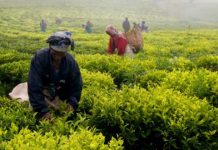THE Tanzania Agriculture Development Bank (TADB) has thrown its weight behind to boost production of Arabica coffee in Mara region through improved yields.
TADB, the full-fledged agri-bank in the country, said through a statement that it will empower farmers and their association by giving them required capital to boost productivity.
The lender said the move involves collaboration with the region administration, various stakeholders, including Tanzania Coffee Board (TCB) and Tanzania Coffee Research Institute (TaCRI).
TADB Managing Director, Japhet Justine said they will empower farmers and AMCOS in the region by providing them with capital by acquiring and planting seedlings, investment opportunities and build wells that will be used to store seedlings during the dry season.
“We will share investing knowledge on preservation and promotion of the seedlings, harvesting and enable them to acquire market for new jobs to be created in the region,” he said.
Mr Justine said the bank has continued to revolutionize agriculture sector in which last year the bank invested more t h a n 23bn/- in cooperative unions in Kagera region and facilitated the capacity building of operation and more marketing advice so that they can benefit from agriculture.
“And in conjunction with the integrated system, farmers are benefiting and more than 5,000 people have been employed, including 1,000 women. Despite these gains, generally these cooperatives have been able to produce more than 50bn/-, he said.”
To begin with the plan, the bank has participated launch of planting coffee seedlings in various blocks in districts of Butiama, Rorya, Tarime and Serengeti.
Mara Regional Commissioner Adam Malima who graced the launch, said to date Tanzania produces 48,000 tonnes of coffee both Robusta and Arabica as he insisted the goal is to produce 200,000 tonnes annually.
He said the average coffee tree produces is 250 grammes of roasted coffee per year for one season but by using the improved yield by TaCRI, the production can increase to 3,000 grammes which is 12 times more compared to the previous seedling.
Mr Malima further said the new seedlings produced have low cost and no easily attacked by bugs. He said on average the region produces 1,500 tonnes, but the new seedling will generate approximately 15,000 tonnes.
“In collaboration with TADB and TaCRI, farmers and Agricultural and Marketing Cooperatives Societies (AMCOS) will be capacitated with farming skills and investment as well as preventing post-harvest loss. This will restore trust in agriculture to farmers to attract jobs and new markets in the country,” he said.
He said price per a kilogramme goes from the national average cost of 900/- to 1,000/- where, using new seedlings, market prices are from 3,500 to 4,000 per kilo and production is higher through new seedlings.







